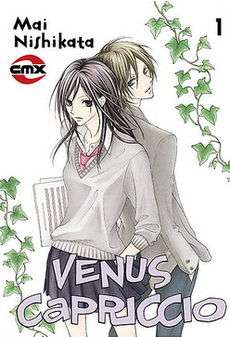Venus Capriccio
| Venus Capriccio | |
|
Cover of Venus Capriccio volume 1 as published by CMX, showing Takami Habara and Akira Sasaki | |
| ヴィーナス綺想曲 (Bīnasu Cappuricio) | |
|---|---|
| Genre | Romance, School Life |
| Manga | |
| Written by | Mai Nishikata |
| Published by | Hakusensha |
| English publisher | |
| Demographic | Shōjo |
| Magazine | Hana to Yume |
| Original run | 2006 – 2008 |
| Volumes | 5 |
Venus Capriccio (Japanese: ヴィーナス綺想曲 Hepburn: Vīnasu Kapurichio) is a Japanese manga series written and illustrated by Mai Nishikata about a tom-boyish girl and her childhood friend who take piano lessons together. It was first serialized in the Japanese semi-monthly shōjo manga magazine Hana to Yume published by Hakusensha.
It is licensed in North America by CMX Manga.[1]
Plot
Venus Capriccio is about Takami and Akira who are childhood friends who attends the same piano classes. Compared to the rough and boyish Takami, Akira is more feminine and cute and is also more skilled in piano. Takami also thinks of Akira as a younger sister, but one day Akira suddenly kisses Takami, and says he likes her…?!
Characters
Main Characters
- Takami Habara (Habara Takami)
Takami is a 17-year-old high schooler. She was brought up in a family of four brothers, causing her to become somewhat boyish. At 10 years old, she was forced to take piano lessons by her mother in order to keep her masculine personality at bay. She didn't like lessons at first because she felt embarrassed by the fact she didn't know how to play.
It wasn't until after she met Akira that she saw that playing the piano could be fun. She didn't realize that Akira had feelings for her, and even viewed him as a younger sister... until he kissed her.
- Akira Sasaki (Sasaki Akira)
Takami met Akira at a piano lesson. Though he is two years younger, 3rd year in middle school as well as a talented pianist. He has numerous first place trophies from piano competitions. In addition, he just has to hear a song in order to play it.
He has bright blue eyes, striking blond hair and an effeminate personality. Because of this, Takami has always thought of him as a little sister; a big problem considering the fact that he likes her. Akira routinely plays the piano for Takami. Sometimes, he does it to cheer her up; other times, he plays her favorite songs from the radio.
Supporting Characters
- Julian Clement (Clement Julian)
- Sayuki Ooishi (Ooishi Sayuki)
- Shinobu Oda (織田忍 Oda Shinobu)
- Shuu Habara (Habara Shuu)
Media
Manga
The manga is written and illustrated by Mai Nishikata, and published by Hakusensha in the Japanese semi-monthly shōjo manga magazine, Hana to Yume between 2006 and 2008. The 29 chapters have been collected in five tankōbon volumes.
In English, Venus Capriccio is licensed by CMX who published the first volume in 2009.[2] With the imprint's impending shutdown, CMX will only publish up to the fourth volume of the series. The fate of the fifth and final volume is unknown.
| No. | Japanese release date | Japanese ISBN | English release date | English ISBN | |
|---|---|---|---|---|---|
| 1 | November 17, 2006[3] | ISBN 978-4-592-18855-1 | April 28, 2009[2] | ISBN 978-1-4012-2061-7 | |
| |||||
| 2 | June 19, 2007[4] | ISBN 978-4-592-18863-6 | August 19, 2009 | ISBN 978-1-4012-2062-4 | |
| |||||
| 3 | December 18, 2007[5] | ISBN 978-4-592-18864-3 | January 26, 2010 | — | |
| |||||
| 4 | May 19, 2008[6] | ISBN 978-4-592-18865-0 | June 29, 2010 | — | |
| |||||
| 5 | September 19, 2008[7] | ISBN 978-4-592-18730-1 | N/A | — | |
| |||||
References
- ↑ "CMX Adds Astral Project, Ballad of a Shinigami Manga". April 21, 2008. Retrieved November 1, 2008.
- 1 2 Sakura Eries (April 29, 2009). "Venus Capriccio Vol. No. 01 review". Mania. Archived from the original on October 3, 2012. Retrieved June 15, 2009.
- ↑ ヴィーナス綺想曲(カプリチオ) 1 (in Japanese). Hakusensha. Retrieved June 15, 2009.
- ↑ ヴィーナス綺想曲(カプリチオ) 2 (in Japanese). Hakusensha. Retrieved June 15, 2009.
- ↑ ヴィーナス綺想曲(カプリチオ) 3 (in Japanese). Hakusensha. Retrieved June 15, 2009.
- ↑ ヴィーナス綺想曲(カプリチオ) 4 (in Japanese). Hakusensha. Retrieved June 15, 2009.
- ↑ ヴィーナス綺想曲(カプリチオ) 5 (in Japanese). Hakusensha. Retrieved June 15, 2009.
External links
- Venus Capriccio (manga) at Anime News Network's encyclopedia
- Comics worth readind vol. 1 review
- Mania.com vol. 1 review
- Comics village vol. 1 review
- Pop culture shock vol. 1 review
